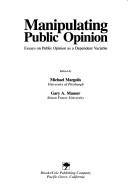| Listing 1 - 10 of 12 | << page >> |
Sort by
|
Book
ISBN: 0312838867 9780312838867 Year: 1979 Publisher: New York (N.Y.): St. Martin's press,
Abstract | Keywords | Export | Availability | Bookmark
 Loading...
Loading...Choose an application
- Reference Manager
- EndNote
- RefWorks (Direct export to RefWorks)
Democracy --- Self-government --- Political science --- Equality --- Representative government and representation --- Republics
Book
ISBN: 9781449313876 Year: 2012 Publisher: Beijing O'Reilly
Abstract | Keywords | Export | Availability | Bookmark
 Loading...
Loading...Choose an application
- Reference Manager
- EndNote
- RefWorks (Direct export to RefWorks)
Want to create devices that interact with the physical world? This cookbook is perfect for anyone who wants to experiment with the popular Arduino microcontroller and programming environment. You’ll find more than 200 tips and techniques for building a variety of objects and prototypes such as toys, detectors, robots, and interactive clothing that can sense and respond to touch, sound, position, heat, and light. You don’t need to have mastered Arduino or programming to get started. Updated for the Arduino 1.0 release, the recipes in this second edition include practical examples and guidance to help you begin, expand, and enhance your projects right away—whether you’re an artist, designer, hobbyist, student, or engineer.
Arduino --- Programmeren --- 525.1 --- Besturingssytemen --- Electronics --- Programming --- Computer architecture. Operating systems --- microcontrollers --- Open Source --- hardware
Book
ISBN: 0140221131 Year: 1979 Publisher: Harmondsworth Penguin
Abstract | Keywords | Export | Availability | Bookmark
 Loading...
Loading...Choose an application
- Reference Manager
- EndNote
- RefWorks (Direct export to RefWorks)

ISBN: 1322416923 1452233470 1452265038 9781452265032 9781452233475 0761913319 9780761913313 0761913300 9780761913306 0761913319 9780761913313 0761913300 9780761913306 9781322416922 Year: 2000 Publisher: Thousand Oaks : Sage Publications,
Abstract | Keywords | Export | Availability | Bookmark
 Loading...
Loading...Choose an application
- Reference Manager
- EndNote
- RefWorks (Direct export to RefWorks)
'Politics As Usual' examines the effects of cyberspace on American politics. The Internet could empower citizens to challenge existing power structures, but the authors argue that the American system tends to normalise political activity.
Internet --- Cyberspace --- Space and time --- Computers --- Telematics --- Political aspects. --- Political aspects --- E-books
Book
ISBN: 9782100727124 2100727125 Year: 2016 Publisher: Paris: Dunod,
Abstract | Keywords | Export | Availability | Bookmark
 Loading...
Loading...Choose an application
- Reference Manager
- EndNote
- RefWorks (Direct export to RefWorks)

ISBN: 0534111211 Year: 1989 Publisher: Pacific Grove Brook/Cole
Abstract | Keywords | Export | Availability | Bookmark
 Loading...
Loading...Choose an application
- Reference Manager
- EndNote
- RefWorks (Direct export to RefWorks)
Political campaigns --- Political socialization --- Public opinion
Book
Abstract | Keywords | Export | Availability | Bookmark
 Loading...
Loading...Choose an application
- Reference Manager
- EndNote
- RefWorks (Direct export to RefWorks)
Digital
Year: 2006 Publisher: Cambridge, Mass. NBER
Abstract | Keywords | Export | Availability | Bookmark
 Loading...
Loading...Choose an application
- Reference Manager
- EndNote
- RefWorks (Direct export to RefWorks)
Book
Year: 2006 Publisher: Cambridge National Bureau Of Economic Research. December 2006
Abstract | Keywords | Export | Availability | Bookmark
 Loading...
Loading...Choose an application
- Reference Manager
- EndNote
- RefWorks (Direct export to RefWorks)
Book
Year: 2006 Publisher: Cambridge, Mass. National Bureau of Economic Research
Abstract | Keywords | Export | Availability | Bookmark
 Loading...
Loading...Choose an application
- Reference Manager
- EndNote
- RefWorks (Direct export to RefWorks)
We develop theory and present a suite of theoretically consistent empirical measures to explore the extent to which market intervention inadvertently alters resource allocation in a sequentialmove principal/agent game. We showcase our approach empirically by exploring the extent to which the U.S. Endangered Species Act has altered land development patterns. We report evidence indicating significant acceleration of development directly after each of several events deemed likely to raise fears among owners of habitat land. Our preferred estimate suggests an overall acceleration of land development by roughly one year. We also find from complementary hedonic regression models that habitat parcels declined in value when the habitat map was published, which is consistent with our estimates of the degree of preemption. These results have clear implications for policymakers, who continue to discuss alternative regulatory frameworks for species preservation. More generally, our modeling strategies can be widely applied -- from any particular economic environment that has a sequential-move nature to the narrower case of the political economy of regulation.
| Listing 1 - 10 of 12 | << page >> |
Sort by
|

 Search
Search Feedback
Feedback About UniCat
About UniCat  Help
Help News
News